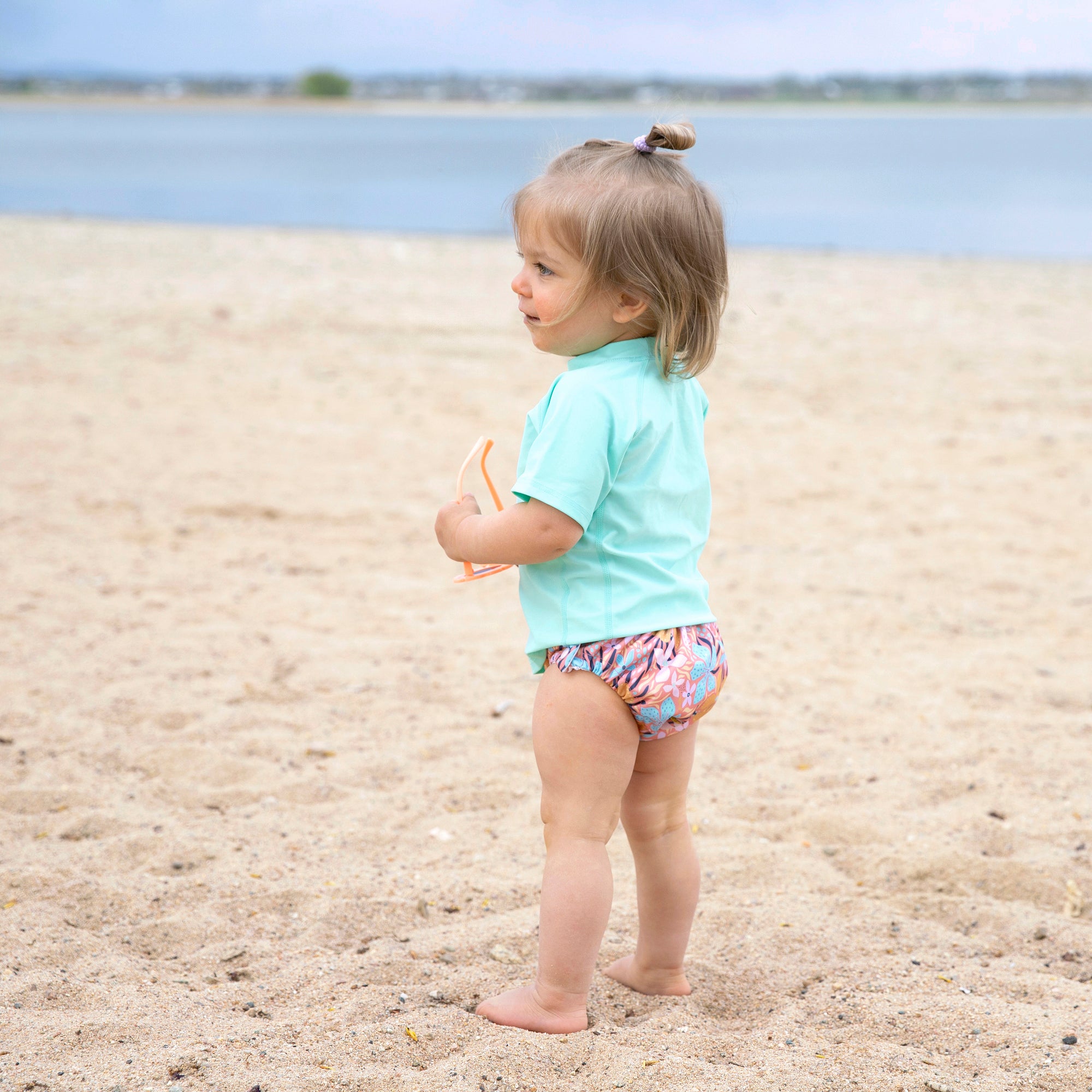If you’ve lived with eczema, you know that it can consist of itchy, scaly outbreaks on your skin that can take some time to soothe and alleviate the condition. Now, give those symptoms to an infant and you’ve got fussiness and skin scratched raw (and often bloody), plus an awful lot of feeling awful for your beautiful little squish. At least, that’s how we feel for our 6-month-old, Hannah. Our older son has dealt with eczema (it’s better now but conditions still pop up) and looking back at how rough his first year was, I’m wondering if some of his overall fussiness was linked to this condition. It’s strange how time away gives you that kind of perspective. (Plus, he was our first so we were all unsure.) We’ve heard from our doctor and his nurses some suggestions to deal with it, but my husband recently consulted with a dermatologist who opened our eyes a little further to some realities of the affliction. In addition to our own additional research, we’re waterlogged with information! Gah. Sometimes overwhelming, y’know? I thought that I’d share our experiences, what we’ve been told (and researched), and how we’ll cope with Hannah’s eczema moving forward. Now, I’m clearly not a medical expert (just a mom and a librarian with a pension for over-researching and over-worrying!), so I’m trying to be clear that you should see a doctor or dermatologist to diagnose and determine a treatment action plan moving forward (and that everyone’s situation is different so I could very well be proven wrong), but maybe our story will help you, at the very least, recognize signs in your own family.
What IS Eczema?
According to the Mayo Clinic, eczema (atopic dermatitis) is a relatively common red, scaly rash that often develops in childhood. It can be seen in the creases of one’s knees, elbows, etc but can occur anywhere on the body (our daughter gets it in her all of her “creases” but especially her neck, belly, around her mouth, and sometimes back). It varies from very mild to severe and is said to possibly be hereditary.
What to Look For
Some rashes may actually be an allergic reaction, so be sure to see a doctor if your child is displaying signs to rule out something more serious. The main thing that we notice is a scaliness that you can feel when you gently touch the rash (or you can visually notice skin that’s raised a bit). It is also often accompanied by dry skin but should not be confused as merely dry, itchy skin. We also tend to know when a flare has occurred when Hannah has spots where she has clearly itched that bring blood to the surface (not horrifically but it shows she’s been scratching a lot, even in her sleep).
What Causes Eczema?
This is the million dollar question. It’s not altogether clear what causes it but there are “triggers” that seem to make it worse or “flare.” As I mentioned earlier, our dermatologist informed us that it seems to be hereditary. And while there may not be a correlation, those with allergies or asthma are more susceptible to having it. In our case, my husband has it. All of our kids have a level of eczema (our middle child has a spot that it tends to pop up but it’s very infrequent and relatively mild). Funny story. Our doctor’s office recently told us to cut out some foods to see if it helps Hannah's symptoms (since I breastfeed). Of course, we’d do anything for our child’s comfort, so I gave up dairy (cheese! Pizza! Yogurt! COFFEE WITH REAL CREAMER!!! Did I mention cheese?!) and nuts. Given that she’s naturally sensitive to lots of things, she seemed better some days and the same on others. It’s still hard to say if there's been any correlation to how she feels or her number of eczema flare-ups. So, this is when my husband heard from the dermatologist who said that a change in diet may help with allergies...but generally not eczema. Again, heredity is the main culprit, followed by environmental factors (like dust, pollen, cold weather, dryness, etc). Now, because folks with eczema have a higher rate of allergies, this correlation is still being pushed. There have been some days that Hannah has been happier and her skin still has sporadic, with no rhyme or reason, so we’re not sure currently where her issue stems from.
What Alleviates Eczema?
This, however, we’ve got down. We use cool mist humidifiers throughout the house all day to try today get rid of some of the dryness. I'm switching detergents for all of her clothes and bedding and have found a more mild bath wash, as well. We're also trying to get on top of all the allergens in the house and treat it as if she DOES have an allergy, which is a tad daunting. It gives me anxiety to simply purchase sunscreen, though, thinking that we're adding yet another factor to the mix! (I know the importance of using it...but I still have anxiety, nonetheless, LOL.)
It's not fun, but super regular cleaning will help with eczema breakouts that correspond to allergens such as pollen, dust, animal fur, etc. So will a change to spring/summer weather and your wash routine - super mild wash specifically for eczema and lather on mild lotion 2-3 times a day (as needed). I massage it in and let it dry a little before putting cloth diapers on. Oh, and this is another one for the “all kids are different” storyline, but going a few days in between baths (which makes sense to avoid drying out) makes Hannah scratch MORE. She doesn't get more moisture from oily skin; she gets drier. So, we do every other day baths to get rid of allergens (and we'll probably do daily in the summer, but we'll see). Moving forward, I’m not sure whether my diet change has helped or not. I know I’ll eventually get cheese back in my life but if there’s no real change, I shouldn’t need to be on the diet in the first place. We’ll continue to treat the symptom of the eczema and be on heightened awareness for allergies and asthma in the future.

We’d love to hear your experiences with eczema, as well! Be sure to share in the comments just in case there’s some parent struggling with their own eczema story (and even conflicting medical opinions) to help each other our.






